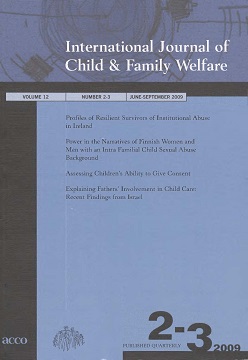Profiles of Resilient Survivors of Institutional Abuse in Ireland
Keywords:
resilience, institutional abuse, child abuse, adult survivors of child abuseAbstract
In a group of 247 survivors of institutional abuse in Ireland, 45 cases (18%) did not meet the diagnostic criteria for common DSM IV axis I or II disorders. This resilient group was compared with a poorly adjusted group of 119 participants who met the criteria for 1-3 DSM IV axis I or II diagnoses, and a very poorly adjusted group of 83 participants who had 4 or more disorders. Compared with the very poorly adjusted group, the resilient group was older and of higher socio-economic status; had suffered less sexual and emotional institutional abuse; experienced less traumatization and re-enactment of institutional abuse; had fewer trauma symptoms and life problems; had a higher quality of life and global level of functioning; engaged in less avoidant coping; and more resilient survivors had a secure adult attachment style. The resilient group differed from the poorly adjusted group on a subset of these variables. The results of this study require replication in other contexts. Therapeutic interventions with survivors should focus on facilitating the use of non-avoidant coping strategies and the development of a secure adult attachment style.

